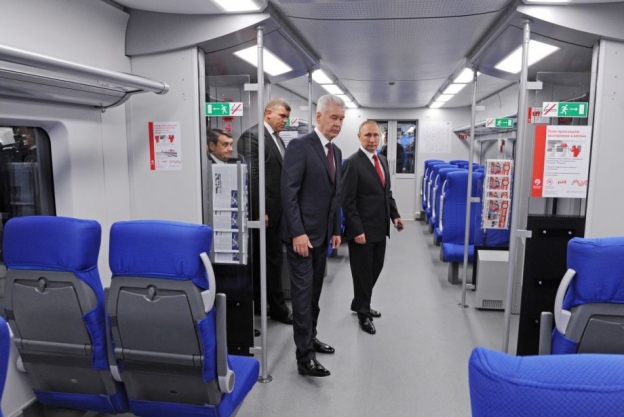Moscow Metro System Opens New Line, 26 Stations

Putin Inaugurates New Moscow Ring Rail Line
As in London, so in Moscow: The Russian capital now has two circular rail transit lines, one underground, the other above.
Railway Gazette International reports that Russian President Vladimir Putin, Transport Minister Maksim Sokolov, Moscow Mayor Sergey Sobyanin and Russian Railways President Oleg Belozerov rode a ceremonial first train from Luzhinski to Ploschad Gagarina stations to inaugurate service on the Moscow Central Ring Railway on Sept. 10.
The 54-km (33.6-mile) line follows a freight rail route built around the turn of the last century. Work began in 2011 on electrifying the line and preparing it for regional rail service. Several freight yards were dismantled and some connections to radial lines removed.
The line now operates as a passenger route from about 5:50 a.m. to 12:30 a.m. daily, with freight service restricted to the overnight hours. The line has 31 stations, 26 of which opened on the inaugural day; the other five are slated to open this year. Except for a short stretch of tunnel near Ploschad Gagarina, the line is entirely above ground. There are 11 interchange points with the Moscow Metro and nine with Moscow Railways’ suburban rail lines, according to an item in the International Railway Journal.
Russian Railways operates the line as part of the Moscow Metro system; its fares will be integrated with those of the metro once the initial free fare period during the first month ends. Ridership is forecast to be 25 million this year, rising to 250 million by 2020.
Digging of New Hong Kong Metro Tunnel Complete
Officials of Hong Kong’s MTR Corporation celebrated the completion of tunneling work on the 11-km (6.8-mile) Tai Wai-to-Hung Hom section of the Shatin to Central Link (SCL) project with a ceremony on Sept. 9, the International Railway Journal reports.
The tunnel will form the central section of the East-West Corridor by linking the existing Ma On Shan Line at Tai Wai with the West Line at Hung Hom.
“The East-West Corridor will extend MTR’s service to the Kowloon City and Kai Tak areas,” MTR CEO Lincoln Leong said. “It will also allow people to travel directly between east and west of the New Territories without interchanging.”
Work on the tunnel began in 2012, but challenging geology and soil conditions led to the use of four different methods for tunneling, including four tunnel boring machines, open excavation, mining, cut-and-cover, and blasting.
Track laying is now underway with a goal of opening the line for service in 2019.
The SCL project also includes a 6-km (3.7-mile) extension of the East Line from Hung Hom to Admiralty via a new cross-harbor tunnel. This segment of the project is slated to open in 2021.
Clock Starts on Albuquerque BRT Construction
A 16-month countdown clock for the Albuquerque Rapid Transit (ART) bus rapid transit line started last week when Albuquerque Mayor Richard Berry signed an $82.6 million contract with the Bradbury Stamm construction company that calls for the completion of the east-west route along Central Avenue (once part of Route 66) by the end of 2017.
The Albuquerque Journalreports that construction on the 9-mile-long line is set to start in mid-October. Bradbury Stamm faces penalties of $2,500 per day if the work is not completed by the 16-month deadline.
Berry said he hopes ART will reach “substantial completion” by the time his second four-year term in office ends on Nov. 30, 2017.
The line will consist of exclusive bus lanes and stations in Central Avenue from Louisiana to Coors. Opponents charge the line will ruin the car-friendly charm of historic Route 66, while supporters say it will spur the redevelopment of the city’s main east-west thoroughfare. Their arguments prevailed when the Albuquerque City Council voted 7-2 to proceed with construction earlier this year.
The total cost of building and equipping the line is projected to be $119 million. The city expects to receive a $69 million federal Small Starts grant to cover most of the cost. Congress has not yet given final approval for the funding, but Michael Riordan, the city’s chief operations officer, said Federal Transit Administration officials have given the city the go-ahead to begin construction and that no project that has reached this stage has ever been denied funding.
- Tags:
- metro





